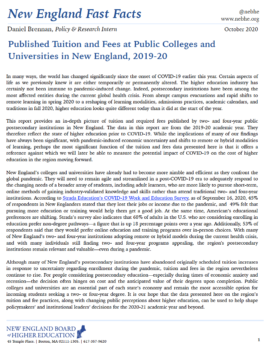 In New England, as with the rest of the country, the price of tuition is one of the main factors that goes into students’ higher education enrollment decisions. As the coronavirus wreaks havoc on both our New England and national economies and people reckon with job losses and wage cuts, this factor seems more relevant than ever. NEBHE’s recently released report “Published Tuition and Fees at Public Colleges and Universities in New England, 2019-20”, written by summer 2020 policy & research intern and Davidson College senior Daniel Brennan, unveils data about the 2019-20 tuition and required fees at New England colleges and universities announced prior to COVID-19.
In New England, as with the rest of the country, the price of tuition is one of the main factors that goes into students’ higher education enrollment decisions. As the coronavirus wreaks havoc on both our New England and national economies and people reckon with job losses and wage cuts, this factor seems more relevant than ever. NEBHE’s recently released report “Published Tuition and Fees at Public Colleges and Universities in New England, 2019-20”, written by summer 2020 policy & research intern and Davidson College senior Daniel Brennan, unveils data about the 2019-20 tuition and required fees at New England colleges and universities announced prior to COVID-19.
While the implications of such findings have always been significant, the pandemic-induced economic uncertainty adds a new dimension. This report provides a reference for measuring the potential impact of COVID-19 on the cost of higher education, as well as a reminder of the importance of state investment in higher education. State investment is often viewed as the counterweight to tuition and fees in funding public higher education.
Historically, New England’s public tuitions have been relatively high, while its state appropriations have been relatively low, compared with the nation. Recently, both sources of funding have been strained by the difficulties of COVID-19.
NEBHE’s new 2012-2020 report provides pre-COVID details on the published tuition and required fees (not reflecting costs such as room and board) of New England’s public two- and four- year colleges and universities.
NEBHE presents this data alongside other important information, such as the average price of tuition in the region before and after student financial aid, historical Pell Grant trends, disaggregated enrollment and tuition data in each state and recent legislative actions to address the rising cost of higher education in New England.
The report uses last year’s tuition and required fee data, combined with a historical comparison of regional tuition information from 2014-15, to shed light on college affordability in a time when higher education is in flux.
Some key findings of NEBHE’s new report include:
- The price of in-state tuition and fees, before financial aid, cost students who are state residents an average of $5,498 at public two-year institutions and $12,881 at public four-year institutions.
- Since the 2018-19 academic year, average in-state tuition and fees have decreased by 2% at public two-year institutions and increased by 8% at public four-year institutions.
- Looking further back, since 2014-15, the average in-state tuition and fees at public two- and four-year colleges in New England have increased by 20% and 25%, respectively.
While college costs and charges for students in New England have risen in recent years, some state legislatures in the region have sought new ways to address the issue. The report highlights a few of the promising bills or financial allocations either introduced or passed during the 2020 legislative sessions.
Massachusetts Legislature
H.1211, introduced in the 2020 session, would establish a “finish-line” grant program to encourage college completion in the Commonwealth. It would cover one year’s tuition and required fees (any year but the first), for students enrolled in a program leading to an associate or bachelor’s degree at one of the state’s public institutions. If the legislation is passed, the funding would be available to Massachusetts residents whose family or individual income is less than 175% of median family income in the Commonwealth. The bill is currently pending and was recently referred to the Joint Committee on Higher Education.
New Hampshire General Court
During the 2020 legislative session, New Hampshire lawmakers passed HB-1582-FN, which established a tuition waiver at any institution in the university system or community college system of New Hampshire for a child of a totally and permanently disabled veteran. The new law also requires the university and community college systems to award college credit for military training courses completed and to increase flexibility in application and course registration procedures for veterans.
Rhode Island General Assembly
H.B. 7501, introduced during the 2020 legislative session, would create a student loan tax credit of up to $1,000 for state residents who have a student loan and who attend(ed) an in-state institution and are currently working for, or planning to work for, the state. This bill has gained significant traction and has been referred to the House Finance committee.
For complete data and analysis, read the full report here.
Sheridan Miller is NEBHE’s state policy engagement coordinator.
[ssba]
